Feeding your baby
Breastfeeding is the most natural way to feed your newborn baby, but new moms may wonder if breastfeeding is for them

There are many good reasons to breastfeed. It provides your baby with multiple nutrients, has healthy benefits for the mother, contributes to the mother-child bond, and provides antibodies and other protective factors that support your baby's immune system to help fight disease and protect against many infections.
Dr. Joan Younger Meek, chair of the American Academy of Pediatrics Section on Breastfeeding states, “Breastfeeding has been found to protect against respiratory illnesses, ear infections, and gastrointestinal diseases, and it may decrease risk of developing asthma, eczema, obesity, and type 2 diabetes in children.”
Studies also show that breastfed infants have a lower risk of sudden infant death syndrome (SIDS). And mothers who breastfeed also have less risk of developing breast cancer, ovarian cancer, and high blood pressure, she says.
Numerous medical societies recommend exclusive breastfeeding for about the first six months, continuing to at least a year old, with additional food added after six months. The World Health Organization recommends continuing breastfeeding until at least two years of age, or beyond, along with additional foods.
Moms who adopt can breastfeed, too, but the process of stimulating milk production ideally should be started a few months before the baby arrives. Those expecting to adopt should discuss this option with their doctor and find a provider with experience supporting breastfeeding for adoptive moms. Some women who do adoptive breastfeeding may need to use supplemental formula if they don’t produce enough milk.
More than 80 percent of newborns in the United States start out breastfeeding. Ideally, breastfeeding should start within the first hour after delivery, with the baby being placed skin-to-skin on the mother’s abdomen or chest immediately after delivery. In most cases, newborns start breastfeeding with only a little encouragement. However, some new moms need help. A health care professional can offer breastfeeding tips.
What to expect with breastfeeding:
- For the first few weeks, most newborns breastfeed every two or three hours, day and night. Look for early signs of hunger, including restlessness, sucking motions and lip movements. Sometimes the baby will need to be awakened for a feeding. Occasionally, the baby will want to nurse every hour or two.
- Typically, a baby nurses for 20 to 45 minutes. Switch breasts when it is comfortable for you, when the milk flow diminishes, or when the baby slows down. Some newborns nurse on only one breast during a feeding. Afterwards, gently burp the baby.
- Mildly sore or tender nipples are not unusual for the first few days. Pain that persists or worsens can have a few causes: the baby not latching on correctly (i.e., sucking on just the nipple instead of placing a widely open mouth on the areola); pulling the baby’s mouth away from the breast without first breaking the suction (this can be done by slipping a finger in between the baby’s mouth and the breast before pulling the baby away); or other reasons. Discussing problems with a health care professional can help resolve issues.
- Having the baby sleep in the same room as you for at least the first six months can make feedings easier. The baby should sleep in their own crib because adult beds aren’t safe for infants.
- Consider delaying pacifiers or bottles until the baby nurses well on the breast first.
- If you use prescription or over-the-counter medications, talk to your doctor to discuss the safety of using them when breastfeeding. Fortunately, most medications can be taken while breastfeeding.



